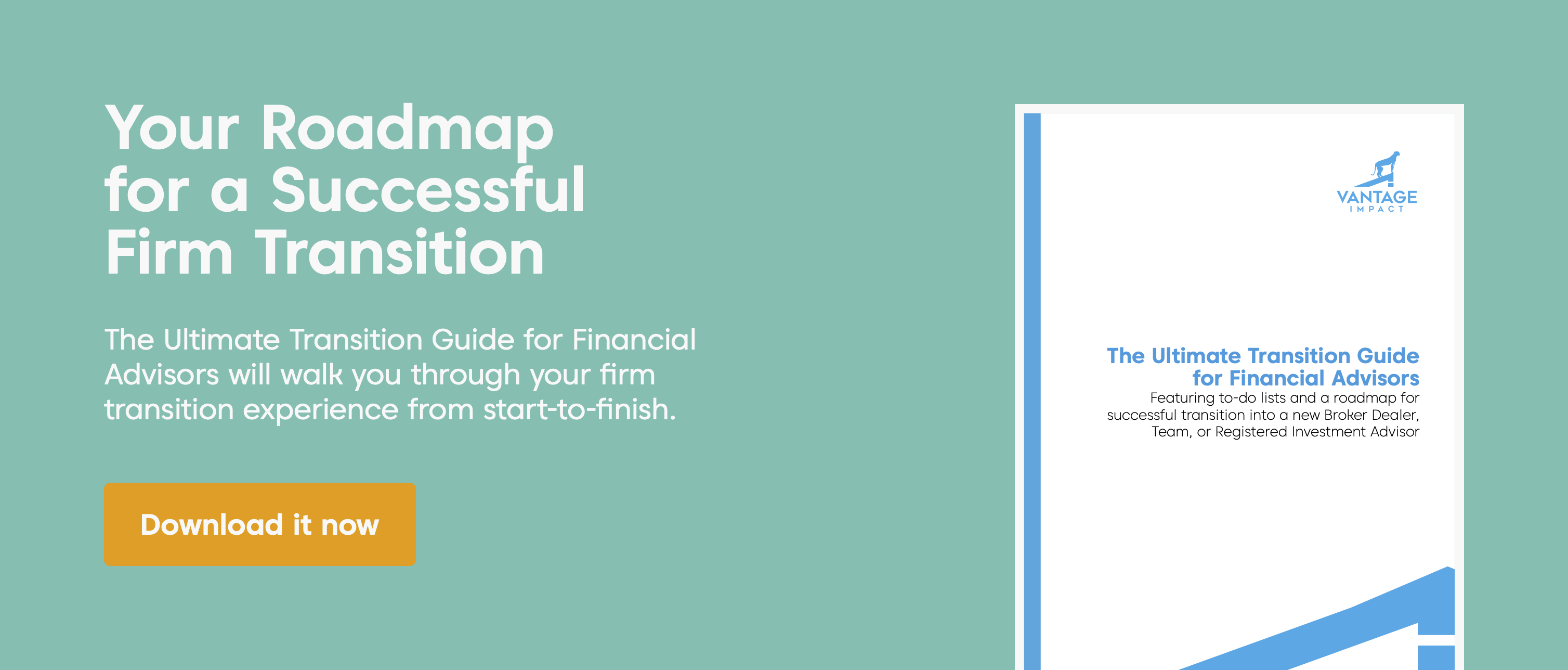When financial advisors receive offers to join other firms, the minutia matters. It's important to fully understand what details should be given special attention and what's just irrelevant industry jargon.
Why is this important? While you may think the offer you receive from a firm is set in stone and there's nothing you can do about it, that couldn't be further from the truth. Firms have a baseline standard for what they think will get an advisor to join their firm, but ultimately how badly they want you to join them and what they're willing to offer will vary tremendously based on several important factors.
Here's a framework for how to put a spotlight on yourself, tactfully negotiate, and get what you're worth in the process.
Before Talking to Any Firms - Start With What's Important to You
As you think about beginning your search give some thought to what the timing of your transition might look like. This doesn't mean you choose a date to transition your practice and turn around to shout this from the mountain tops so the whole world knows (Actually, don't tell anybody for now, this is just a mental exercise).
Think of this the same way you would when you start a financial plan with your clients. It's about setting goals that you'll strive to meet over time. Without this, you'll likely end up wasting time and becoming frustrated due to lack of preparation.
So let's begin. First you need to decide if you're going to leave your current firm. All too often people fail to answer this question and end up doing a lot of unnecessary work looking into new firms. If you start looking at new firms before you answer this question, it would be like recommending a stock without doing your research beforehand. Or looking at new homes before deciding what would need to be different with your current house to keep you in it. It all begins with- should you stay?
Start with an introspective assessment of where you're at, and work from there to determine where to go. In my years of helping advisors with these questions it typically comes down to two things:
- They're likely not getting enough of what they were promised, or
- They move to get access to an opportunity not offered where they are today.
Take the time to get these questions answered for yourself. Think of it as taking an opportunity to evaluate your happiness with your current firm, and whether your future is better suited elsewhere.
This time will be spent:
- Rating the support you're receiving from your firm
- Evaluating the financials of your practice
- Determining what would need to change to keep you happy where you're at five years from now
- Deciding what are the non-negotiable items you need from a new firm
- Determining the top priorities in your business and ensuring you keep focused on these items
- Thinking about what changes you would make about your current firm that would improve your happiness
Once You Start Talking With New Firms - Be Intentional and Organized
Now it comes down to deciding who's good enough to get your business. It begins with ruling out the pretenders and identifying the real contenders. With the right resources to support you with this process things will go a lot more smoothly.
Let's get your short list of firms going by building upon the preparation you've already done. With an initial short list in mind, begin to commit adequate time to exploring what other firms have to offer.
If you don't know how much time to dedicate, a reasonable benchmark is about a month per each firm you choose to explore. So diligently looking into six firms should take about six months. While this is just an average, it is important to thoroughly do your research as this will likely be the biggest decision you make in your career.
At this point you've already decided you'll likely leave your firm, and how much time to take to employ your search, so where does that leave you? It's time to get introduced to the right people at these new firms.
Make sure you're talking to a leader who's been with the company for awhile. They should come across as knowledgeable, not sales-y. These are people who should have answers to your questions. Would you seek out a surgeon who's new to their profession? Didn't think so.
During your exploration of learning about what other firms have to offer you'll be given access to information about these companies and likely visit with key leaders of the firm. At some point you'll be invited to a home office visit or VIP trip. These trips serve two important purposes:
- Moving from a baseline understanding of the company to knowing the future direction of the company, and
- Forming relationships with the people who are making promises to support you in the future.
As a financial advisor you know this is a business built on relationships, so get to know the people at these companies. Prior to embarking on this trip, set aside some time to proactively develop questions you need to have answered. Be consistent with how you gather this information, as you'll soon be trying to compare and contrast a number of firms.
As you arrive back home after these trips, you should have a full understanding of how joining this firm would positively impact your business, benefit your clients, and improve your life.
This time will be spent:
- Working with an objective third party to rule out firms that don't meet your needs
- Getting connected with resources at new firms to showcase their capabilities and answer your questions
- Uncovering things that may be inconvenient if you make a move and obstacles that will need to be overcome
- Identifying products in your practice that won't be portable over to a new firm, meaning the assets and/or revenue won't follow you to the new company
- Weighing tradeoffs (there's no perfect firm)
Getting the Offer - When The Real Work Begins
At this point you've already decided you'll likely leave your firm, and how much time to take to employ your search, so where does that leave you? Depending on the size of your team you'll likely want to add another 60-90 days to mentally, strategically, and physically prepare to transition your business to a new home.
This time will be spent:
- Getting input from your trusted inner circle on the terms and characteristics of your offer
- Talking with legal counsel to design your transition plan
- Conducting an inspection of the impacts a move would have on your business and negotiating appropriately
- Drafting legal agreements between other advisors or staff in your practice to ensure the business is established the right way
- Putting next steps on the calendar and crafting your communications plan
- Articulating what you will tell clients about why you joined this firm
Keep in mind firms are always looking to close the deal and move on to the next one. It might not be the first thing that comes to mind, but this can be used to your advantage. The more intentional you are with your plans and the more transparent you can be with the firms you're considering, the more you will be on their radar, and staying on their radar leads to good things.
Firms will pay more for a promising opportunity. So what does that mean? When you approach this process the right way, great things can happen. One bad assumption or misstep can lead to big headaches. We’ve seen unprepared advisors ruin their careers and prepared advisors significantly increase their assets under management because of a transition.
Be intentional about what you need and don't get blindly recruited. Contact us to help make this an enjoyable experience for you.




